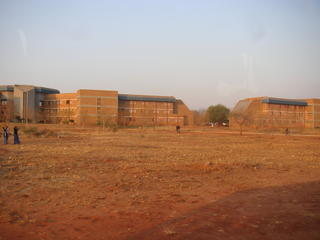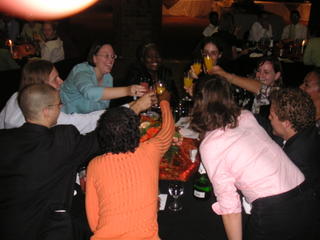Letter to my parents, dated September 2, 2005
So, this letter may contain information that seems like a war story. . . but don’t fear! I do love my time here and whatever negative thing I write is balanced out by at least two positive things. The negative things just seem so much more interesting to relate.
First, I think I told you that I’m living with a host family in Moletji with a mom, Rosina, a 12-year-old, Sydney, and a 4-year-old (5 on Monday!), Meipone. Pretty much all of the time, I lock the door to my bedroom for two reasons, privacy when I’m inside and to keep 4-year-old hands out of my clothes and away from my stash of cookies and power bars. My host mother works during the day and I’m away at classes almost all day. Sydney has keys to the outside lock to let himself and his sister inside after school. On Wednesday, I came home, unlocked my door, put some stuff in my room, and went back outside. Sydney is nowhere to be seen but that’s normal because he usually wanders around the village. My host mother came home, asks me to help her and as I’m helping, walks up to me holding my iPod in her hands asking, “what’s this?”
I put on my best shocked (because that’s what I was) and turned over the iPod to show her where my name is engraved on it, “It’s mine and my room is locked unless I’m at home.”
She tells me that she found it in Sydney’s room and comes to conclusion on her own that he took it from my room. I took my iPod back to my room and look around to notice that Sydney carefully searched my room for the iPod and then re-locked the door after himself. My host mothers instant solution, “I’m going to beat that boy.” A couple of hours later when he still hasn’t come home, she amends it to taking away his keys to the outside door, that way he can only get inside when if his mom or I am home. When he does come home, I’ve already gone to bed for the night and can hear some heated talking in SePedi. Apparently, Sydney told his mom that I let him borrow it and she told him that he was lying. Really, I think this is the best case scenario for this situation. My host-mom completely took my side and protected my stuff, my iPod works fine, and I don’t think she beat him badly. Meipone is amazing and I got a bonding experience with my host mom as well.
Second, I think you have a general idea that South Africa isn’t as safe as the United States. One prime example occurred Saturday afternoon. A group of six men were some how involved with fraud against the local tribe in Moletji. The understaffed, underpaid, and undertrained police caught 5 of the 6 men, but the tribe caught the sixth. At the shabeen (bar) three blocks from my house he was beat to death with a hammer in broad daylight and plenty of witnesses. If volunteers went into a shabeen, the local people and schoolteachers would not treat us with respect so we don’t go into them in our villages. Besides, the shabeens in the villages are not safe, but in the cities they’re as safe as any bar in the US.
Third, we were 88 trainees and now we’re only 87. A NGO/health trainee decided to go home after three days sick and some time in the hospital. She was getting better and could have stayed, but after discussing her options with the Peace Corps doctors she’s decided to go home. I don’t think she had made any real friends amongst her fellow trainees and probably didn’t have the best support system when she did get sick. I think her sickness had something to do with the food and her diet. The only other person that has been sick is one of the other two people in my training group, Caitlin. She ate something bad, couldn’t wash her hands well, or there was something in her water and ended up with fever, chills, and stuff coming out of both ends. She saw a doctor that afternoon and was better the next day. I think I’m getting better health care here than in the United States.
Alright, onto other topics. I’m having trouble getting news here. I’m so busy during the day and at I night I listen to the radio but it’s all in SePedi. Yesterday, the Peace Corps gave us the last month’s worth of Newsweek. I have never been that excited to hold a month old news glossy in my hands.
I’ve been hanging around with the people in my language group recently. There’s Joel (Lehlotlo, walking stick), our language instructor, Becca (Tlou, elephant), and Caitlin (Mogadi, no meaning). My SePedi name is Lethabo, happiness. Joel is a young South African who grew up in the township outside of the closest city, Polokwane. Most of the language trainers are 25 to 35 year-olds who have teaching experience. The ones that I’ve gotten to know a little are funny and way too over-protective of us. For example, while in Moletji Joel will walk to our houses and make sure that we are still ok. Most of the time he’ll visit after seeing us an hour earlier. Caitlin and I have similar backgrounds, she just graduated from Harvard in biochemistry. Becca spent the last couple of years in Texas working as a primary school teacher. They’re both really nice but I haven’t really become friends with them yet.
On Monday we’re all leaving Moletji for three different locales, 10 education trainees will travel to the Northwest Province and attend supervisor’s training at the Lion’s Den. The rest of the education trainees are going to Oasis outside of Polokwane. The NGO/health trainees are going to a resort outside of Pretoria. While we’re all going to different locales, we’ll all be doing similar things. Monday morning we’re all told the site that we’ll be serving at for the next two years. After we’re told, we’ll travel to our respective supervisor training locations and spend three days working with our supervisors. For education volunteers, the two or three principals that we’ll be working with will be there. After training, wining, and dining, we’ll travel to our sites with our supervisors. We’ll spend the next three days living and negotiating with the family that we’ll be staying with for the next two years and visiting the schools or NGOs that we’ll work with. After that we’ll stay with a current volunteer for three days. Finally, we’ll travel in the taxis back to Moletji. I think everyone is really excited to find out where they’re serving but we’re not ready language-wise. Almost everyone that we’ll work with speaks English but so many of the side conversations occur in the local language. When we return, there will only be four weeks left of training, it’s so short!
Postscript, Monday, September 5
So. . . last night I decided to charge my iPod before taking it with me on this mini-training trip. I borrowed a luggage lock from a friend and locked my iPod in there along with my passport and leatherman. Low and behold my iPod was missing (but only the iPod) although I keep my room locked and it was in a locked bag. My host mom wasn’t home when I discovered it, and I couldn’t stay in the house any longer. I went to tell Joel, my language trainer and liaison to all Peace Corps staff, and also found a couple of friends. With Joel’s help, the plan was set to pack all of my belongings, leave the things I don’t need this week at his house, and get a new family when I come back. I was pretty upset, and decided to have a nice, chill dinner with Peace Corps trainee friends (an older married couple, Tom and Brooke, and Caitlin from my language group). Dinner lasted until about 7:45, when Kedibone, the training manager, pulls up to Tom and Brooke’s and asks to talk to me. The first thing she does is berate me for not being at home and asking my host mother for permission to eat with my friends. I end up apologizing for being out past dark, but it really wasn’t what I needed at the time. Sydney had not been home all weekend (he’s only 12!) and the host mother really could not have reacted better to my telling her that my iPod was missing again. She stayed home from work this morning to try to locate it.
This brings my tally of moving to seven times in the past month. I’m trying to look on the bright side of things and say that I get to meet a new family and will just get introduced to a wider slice of life but it’s hard because I really like my host mother and sister.








